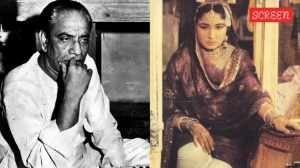Students spend Rs 50 on `sex education’
NOVEMBER 29: Clad in school uniforms with bulging book bags on their backs, teenagers playing hookey for a quick tryst with prostitutes ar...

NOVEMBER 29: Clad in school uniforms with bulging book bags on their backs, teenagers playing hookey for a quick tryst with prostitutes are an ever-increasing sight in the city’s redlight areas. As social workers express concern over the students’ lack of awareness about infection and AIDS, experts explain the rise in numbers as the widening gap between the onset of puberty and marriageable age.
Explains Dr T P Aneja, “Hormonal and environmental changes together with the onslaught of the mass media have reduced the age of puberty in boys to 11 or 12 years. However, they only marry as late as 28 years and try to satiate their curiosity and desire during the intervening productive years. Experimentation in the absence of scientific knowledge leads to such behaviour.”
In the absence of a regular daylight police patrol and a lack of laws to curb these `visits’, social workers find it daunting to prevent adolescents from all stratas of society from being solicited by prostitutes. Reveals a `tai’ who is now involved in the rehabilitation of prostitutes’ children, “That boy is from a good family but he comes here two to three times a week, visiting a different kotha each time.” Earlier, too, school boys visited prostitutes but were more discreet. “They roam around here freely clad in their uniforms,” she adds.
Some brothel owners threw their hands up in exasperation. “Don’t blame us if they come here, boys have to become men some day. No, it doesn’t matter if it’s a little before time,” says Roopkala, a brothel owner. Another brothel owner, Poonam, expressed guilt about allowing adolescents to visit the girls in her brothel. “I don’t feel guilty when men come here. With them it’s business but giving a girl to a toungster is a sin,” she states.
More dispassionate are prostitutes who see clients as their ticket to survival. If a prostitute turns away a `young’ client by quoting a high price, he returns with the requisite amount. “Buying sex in the redlight areas is not that expensive – it can be bought as cheap as Rs 50.” says a social worker. “Some boys even indulge in petty thefts to get the ammount. Rs 50, three time a week is quite a lot and ask the girls the kind of presents they get” says Rohini Tai.
There is a dire need to strengthen the sex education pattern in the schools and colleges. “In the initial years teach them to avoid sexual abuse, then graduate to other topics as the child grows in age and mind,” says counselling psychologist Dr Pragna Mehta. Alcoholism and the onslaught of mass media pornography are also reasons for this new trend. “Many adolescents who solicit prostitutes are under the influence of alcohol. We need to embark on mass sex education and awareness programmes,” says Dr Mehta who also feels that such encounters blight the teenager for life. “It leads to a kind of abnormality in adolescents who go on to fail in normal relationships,” she explains.
Where to get help
Networking to empower people living with HIV/AIDS and providing a system to cope with their infected status is a daunting task for the agencies involved in the battle against the disease. The Maharashtra Network For Positive People (MNP+), an organisation set up by people with HIV/AIDS recommends strong legislative measures to protect the individual rights of those affected with HIV/AIDS.
The organisation also advocates the full participation of person(s) living with the disease on decision making bodies dealing with issues related to the epidemic, at the local, state, national and international level. They plan to lobby with the government for legislation and commitment to protect the needs of these people including the rights to travel, employment, marry, have children, job security, housing, education, access to medical care and to obtain an insurance cover.
MNP+ was formed to develop a conducive environment to improve the quality of life of people living with HIV/AIDS. The organisation has been vigorously campaigning for recognition of the fundamental rights of those affected. By developing a networking system throughout the state, MNP+ plans to take the first step towards empowerment of people with AIDS.
The organisation will act as a watch dog to ensure that the various drug/vaccine trials are ethical, clearly explained, strictly monitored and that the trial participants are fully insured against negative drug effect through participatory involvement.
AIDS helpline
Counselling and Allied Services for AIDS (CASA) offers free and confidential help to individuals, couples or families from Monday to Friday (10 am to 5 pm) and Saturday (10 am to 4 pm). Call on helpline 4467665 or send mail to casa@vsnl.com
CASA also provides counseling at Bhatia Hospital every Wednesday from 2 pm to 4 pm, The Conwest-Jain Clinic on Mondays, Wednesdays and Fridays from 11.30 pm to 1.30 pm and The Hurkissondas Hospital on Wednesdays and Friday from 9 am to 11 pm.



- 01
- 02
- 03
- 04
- 05




























